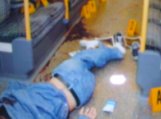I’ve wanted to say something about the Metropolitian Police finally being held responsible for their murder of Jean Charles de Menezes, but I think Palau said everything I wanted to say on Friday about the Met’s continuing refusal to accept this responsibility:
But if there has been a defining leitmotif of the Labour years it’s been this, this constant, mulish refusal to take responsibility for incompetence and error, this wilful blindness to one’s own fault and this utter certainty, despite all the evidence to the contrary, of one’s own rectitude.
Anything to justify hanging on to power for power’s sake.
To much of the public it’s simple. Blair is responsible for the safety of the public. He didn’t do that, he did the opposite. He should go. Like his namesake the forner prime minister, Blair argues he’s not guilty of any personal wringdoing therefore he’s squeaky-clean and should stay in the job.
Anyone who gets up in the morning in a crowded city and gets on a metro or a tram or a tube system will have seen that CCTV footage of Jean Charles de Menezes’ extra-judicial murder and will have seen themselves in that blurry video, on the floor, scared out of their wits, about to
have their brains very deliberately blown out on the carriage floor.
But Londoners have real cause to fear; their police chief thinks that the deliberate murder of an innocent man by his subordinates is not a serious matter enough to resign over. ‘Mistakes happen’.
Palau hints that the reason various government officials and Nwe Labourites, including London mayor Ken Livingstone have rallied around Ian Blair may have something to do with the police chief’s habit of taping phone calls, ala J. Edgar Hoover back in the day. Personally, I think
it’s simpler than that. The first instinct of New Labour when confronted by a fuckup has always been to deny responsibility and shift the blame away from theirselves. Mistakes may be made, but they should not have consequences for the people in charge, who always do the best they can in difficult circumstances. Livingstone has long ceased to be a rebel and has fully reintegrated himself into the New Labour project, hence has no problem defending Blair.
Speaking of Livingstone, Jamie K tears apart his defense of Blair:
Of course counterterrorism is hard. The point is that counterterrorism is irreducibly hard. If you make it “easier” by tolerating a permissive attitude towards killing innocent people, then that is what will happen. To reverse Livingstone’s thought experiment: what happens if an armed police
officer in pursuit of someone who he believes might be a terrorist but isn’t quite sure starts making calculations along the lines of “I’m legally immune so I’ll shoot him anyway, just to make sure.”
Alex does away with the idea that “our security” means we cannot criticise the security forces:
More seriously, where do these people get the idea that organisations with safety critical functions work better in the absence of criticism or responsibility? It can’t be from experience; Kettle is a career pundit, having started out as a leader writer. The whole history of safety engineering is the exact opposite; if you’re playing with the big boys’ toys, you cannot afford to skim over your mistakes, ever. There are very good reasons why airlines have senior training captains and CHIRP confidential-reporting forms, companies have external auditors, and newspapers have editors.
Or IT companies have software testers, for that matter.
Alex also has a post up about all the things we still don’t know about the shooting and how the Met seems more interested in smearing de Menezes again than finding out exactly what happened that day. Standard operational procedure it seems with the Met; see also the Forest Gate affair.
